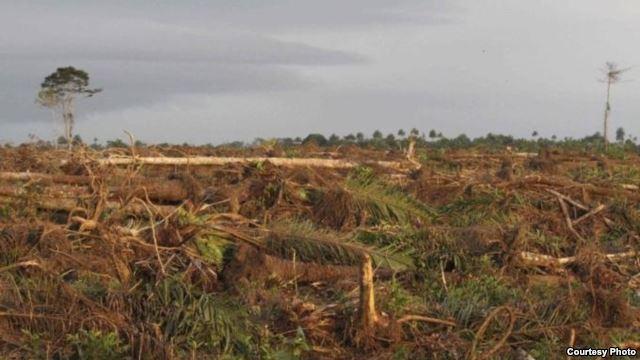14 November 2013 4 menit
Demand for Palm Oil Fuels Land Conflicts in Africa, Southeast Asia


Kim Lewis
Last updated on: November 14, 2013 9:53 AM
As the world’s demand for palm oil increases, deforestation and the resulting release of carbon dioxide emissions continue to be a concern. However, The Forest Peoples Programme, a human rights advocacy organization dedicated to securing the rights of people who live in forests, recently released a report that said the growing global demand for palm oil that is fueling the large-scale expansion of palm oil plantations across the forests of Southeast Asia and Africa, is also a human rights issue.
Palm oil has become a lucrative business, said Norman Jiwan, executive director of, Transformation for Justice Indonesia – TuK INDONESIA, and, co-editor of the report that was released at a press conference in Medan, Indonesia. He explained that the crop produces a higher yield of edible oil compared to other edible crops, including soy and grape seed.
He also explained that the huge demand for palm oil in the world marketplace has fueled expansive land clearances, and most of this is done illegally, without the consent of the local land owners.
“This mass expansions of palm oil industry in Indonesia has created serious land conflict because of the land grabbing, land clearing without consent from local communities and indigenous peoples. And the likelihood of local communities and indigenous peoples’ right to food is being threatened because of the massive expansions of the palm oil industry,” said Jiwan.
A United Nations mandate created in 2001 called the Roundtable on Sustainable Palm Oil, or RSPO, was designed to bring deforestation under control. In addition it established clear guidelines for the ethical and ecological production of palm oil that member companies, which represent about 40-percent of the global palm trade, would adhere to.
“It’s really good to have standards on paper, but the question from our human rights perspective is, ‘To what extent these standards are implemented—and properly address the issues of rights of local communities and indigenous peoples?’” said Jiwan.
Major expansion of the palm oil industry is also taking place in Africa. The countries involved so far are, Liberia and Cameroon. There are also plans for production in the Democratic Republic of Congo and Ivory Coast.
Dr. Marcus Colchester is senior policy advisor for the Forest Peoples Programme.
“Unfortunately, what we are seeing is the same kind of problems as we have already identified in Southeast Asia. That’s to say the governments are handing out permits to these areas without first talking to communities, without firstly making sure their rights are recognized and secured. And so, the conflicts are brewing up in these different countries as the companies come in and take over the land and forests of these indigenous peoples, and other local communities,” explained Colchester.
On the bright side, the senior policy advisor highlighted that member companies of the RSPO have responded to two complaints filed in Liberia with the help of the Forest Peoples Programme. The companies have agreed to slow down production and – in some areas – to stop production until the land disputes are settled.
“That process is underway, and so it does show to us that there is a value to this procedure –that the RSPO have called a new planting procedure, whereby companies planning to plant, should first announce their plans and then there’s an opportunity for communities or NGO’s to raise concerns. This should allow problems to be solved in advance of the expansion of the frontier,” said Colchester.
He acknowledged the legal process is a slow process, but still a good sign that progress is being made in taking human rights into consideration along with the environmental concerns.
“What we find through our studies is, the national legal framework is also at fault, because the governments and the law don’t recognize the land rights of the people. Therefore the companies are coming in; the conflicts are proliferating. So, we’re also calling on the government to reform their national laws to recognize rights,” commented Colchester.
The publication, “Conflict or Consent? The Oil Palm Sector at a Crossroads,” not only documents human rights violations, but hopes to bring added attention to the need for world leaders to include human rights violations in their plans of addressing deforestation and land degradation.
Sumber:
Voice of America
